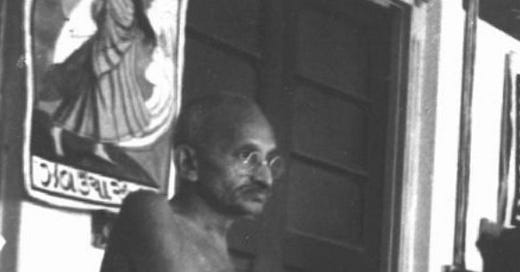After a short burst of freedom, Gandhi was sentenced to a year in prison on August 4, 1933. As I wrote,
Once back in his cell, Gandhi began writing letters to the prison authorities, telling them the special treatment he would require during his stay in Yerwada Temple. When they balked, he threatened a fast to the death.

Gandhi fired off 10 letters to the government before beginning a fast on August 16. He demanded he be allowed to continue his anti-untouchability work and manage his weekly newspaper, Harijan, from the prison. The government offered a few concessions which seem relatively generous to me, including two visitors a day, thrice weekly correspondence to Harijan’s editor, and a convict-typist to assist him with his work. This was unacceptable to Gandhi. His next letter laid out seven points to be settled before he would break his fast—and added an eighth in the postscript!
Three months earlier, after beginning a 21-day fast, the government had released him. This time, they offered to a conditional release: he must “abandon all civil disobedience activities and incitements … [and] devote himself wholly and without restriction to the cause of social reform.”1 This too, was unacceptable.
After five days, his health was failing, just as it had the previous year during the Epic Fast. The prison superintendent transferred him to Pune’s Sassoon Hospital. Kasturba, who’d been arrested with him three weeks earlier and was serving her own six-month jail sentence, was released and brought to see her husband.
Would this be the fast that ended Gandhi’s life? After an uncomfortable night, he feared it was, and gave away the few possessions he had with him to the hospital staff. Everyone waited to see what would happen…
On August 23, the government announced Gandhi had been released unconditionally. A week after his fast had begun, he sipped from a glass of orange juice, then whisked away to recover. If he did die, it wouldn’t be in British custody.
“The most unexpected event of my life has happened,” he wrote after arriving at a friend’s bungalow. “How I shall use this life out of prison, I do not know.”2 Gandhi wondered if he should be ashamed for leading his people to prison and abandoning them there through his fast. In September, he publicly admitted he had coerced the government into releasing him. Still, intent mattered: the goal was for them to see the justice in his demands or allow him to die if they could not.
Soon, Gandhi announced his decision. He would voluntarily observe the terms of the offered conditional release, devoting the next 11 months to Harijan service. Surprisingly, he found himself undertaking another week-long fast at the end of it.
Have you ever made an ultimatum only to get an unexpected response?
Collected Works of Mahatma Gandhi (Excerpts from viceroy’s cable, August 18, 1933) p. 30,016
Ibid. (The Breath of Life, August 23, 1933) p. 29859


